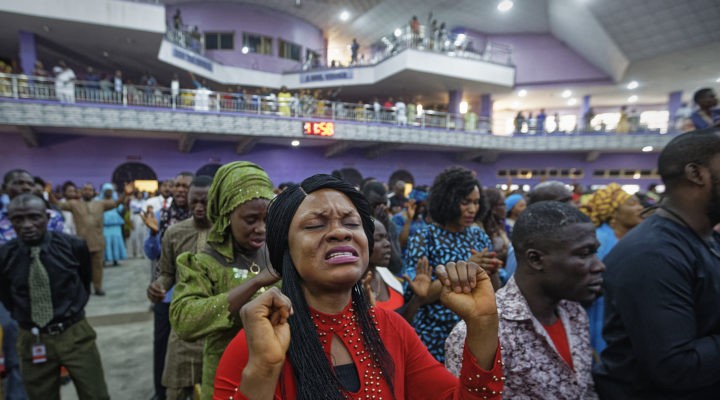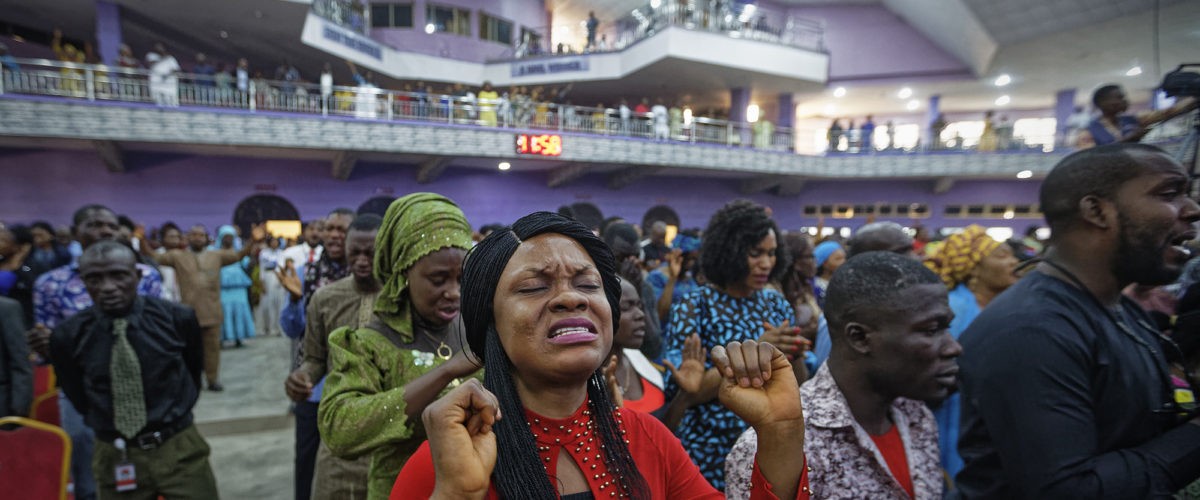While in the 19th and 20th centuries, America was seen as an exporter of Christianity to the rest of the world — in particular Africa — the 21st century is bringing a change some have called “reverse missions.”
The United States remains an outlier among Western countries for its religious devotion, yet citizens of African countries today often prove to be more devout, more public with their faith and thus exert more global witness than Americans.
“In the early years of the 21st century, the largest church in England was led by a Nigerian missionary pastor. Similarly, in Kyiv, Ukraine, Europe’s largest church was shepherded by a Nigerian. Churches like Ghana’s Church of Pentecost and Nigeria’s Redeemed Christian Church of God have established centres all over the world,” according to The Africa Study Bible in a report published by The Gospel Coalition Africa.
This trend is what sometimes gets labeled “reverse missions.”
‘Love the Lord recklessly’
Mirriam Kaliza, a Malawian journalist, told BNG that Christianity is on the rise in the country, and that in Malawi as well as Nigeria, some pastors or churches are establishing branches outside the country.

Mirriam Kaliza
“We have several denominations in Malawi from the traditional churches like Catholic, Presbyterian, Seventh-day Adventist, among others, but over recent years, the country has seen a sudden interest in people opening up Pentecostal churches, others headquartered in other parts of the world such as Nigeria, Ghana just to mention a few,” she said.
Malawi and many other African countries are extremely religious, Kaliza said: “Malawi is best known as a God-fearing nation. In Malawi, meetings do not start without offering a prayer even if the issue involves corruption. So I would say Malawians take religion seriously and when people identify themselves as atheist they are given a side-eye (viewed as weird).”
In a recently published interview with BNG, Marsha Scipio, an American citizen who recently was named director of BWAid, spoke of the time she spent in Liberia, West Africa, after her first year of seminary in the U.S. Liberia, at the time, she said, was recovering from civil war and Scipio, who served at Providence Baptist Church in Monrovia, recalled meeting people who “loved the Lord recklessly.”
That description fits much of African Christianity.
Sunday a busy day
In Nigeria, Africa’s most populous country, an overwhelming majority of people — be they Christian or Muslim — consider religion paramount and show intense passion and devotion in their worship. Churches or mosques have popped up in most neighborhoods and are as common as the house next door. In some places, churches appear to compete with one another in setting up branches.
In some places, churches appear to compete with one another in setting up branches.
This makes Sunday a busy worship day for Christians and churches across Nigeria. Prior to COVID-19, the Lagos-Ibadan expressway that serves as headquarters for some churches became so packed with cars that it posed a challenge to travelers in general and to people attending one church program or the other.
Now, this vigor that the average Nigerian displays in matters of faith, and the high turnout rate at churches in the country, is being exported to many parts of the world including the United States and Britain.
This passion for faith abounds across sub-Saharan Africa. It is a passion deeply rooted with a history predating the modern era.
History of religious devotion
Some historians argue that Africans always have been religious as traditional forms of worship were part of the people’s way of life before the coming of the white man to their part of the world. Yet the slave trade era and missionary incursions in the continent by white merchants introduced, for many indigenous people, a new model of worship that gradually gained ground.
 “The evangelical revivals of the 18th and 19th centuries in the United States and England produced the modern missionary movement. Denominational missions and faith missions such as the Africa Inland Mission, Sudan Interior Mission, Sudan United Mission, and the South Africa General Mission (later the Africa Evangelical Fellowship) influenced African societies,” according to the Africa Study Bible. “Schools, hospitals, churches and many social agencies in Africa were the result of missionary efforts in partnership with African Christians.”
“The evangelical revivals of the 18th and 19th centuries in the United States and England produced the modern missionary movement. Denominational missions and faith missions such as the Africa Inland Mission, Sudan Interior Mission, Sudan United Mission, and the South Africa General Mission (later the Africa Evangelical Fellowship) influenced African societies,” according to the Africa Study Bible. “Schools, hospitals, churches and many social agencies in Africa were the result of missionary efforts in partnership with African Christians.”
Then, the book explains, “by the 1990s, charismatic Christianity had transformed the face of many Christian traditions in Africa. Some new Pentecostal churches began preaching a message of healing and power. This message captured not only the poor and disenchanted but also the young, upwardly mobile urban professional class in Africa’s growing cities.”
As a result, Africa is now considered to be “one of the most dynamic centres of Christianity in the world,” with “a significant share of the world’s 2.2 billion Christians … about 30% of the world’s evangelicals, 20% of the world’s Pentecostals and charismatics, and about 15% of the world’s Roman Catholics,” according to the Africa Study Bible.
Data show higher levels of attendance
A 2018 Pew Research report alludes to African’s deep religious ties: “The study analyzed 84 countries with sizable Christian populations. In 35 of those countries, at least two-thirds of all Christians say religion is very important in their lives. All but three of these 35 countries are in sub-Saharan Africa or Latin America.”
Leading the statistics of countries where people consider religion very important is Ethiopia with 98%. Others are Ghana (89%), Nigeria (82%), and South Africa (79%).
“Christians in Africa and Latin America also tend to pray and attend church at higher rates than Christians in most of the rest of the world.”
The research found that “Christians in Africa and Latin America also tend to pray and attend church at higher rates than Christians in most of the rest of the world. For instance, at least four out of five Christians in Nigeria, Liberia, Senegal, Cameroon and Chad pray every day.”
These findings “reflect the broader pattern of Christianity’s ‘march southward’ from wealthy countries to developing ones.”
Comparatively, Pew noted, “the United States remains an outlier among wealthy countries in terms of its relatively high levels of religious commitment. In the U.S., more than two-thirds of Christians say religion is very important in their lives, compared with significantly lower levels in other rich democracies. For instance, only 12% of Christian adults in Germany and 11% in the United Kingdom say religion is very important in their lives.”
Pentecostal and prophetic influence
The version of Christianity being exported from Africa varies from the traditional to the independent, from the evangelical and mainline denominations to the charismatic prophecy-based variety.
One example of the latter is Stella Immanuel, a Cameroonian-born American doctor and preacher at Firepower Ministries in suburban Houston, whose spiritual parents are Nigerians. She is a Pentecostal prophet who gained national prominence for her stance on a discredited treatment for coronavirus.
She sees in Africa a place of deep faith and believes the future of Christianity is in its grip. “I believe so because Africa still prays,” she said. “Christianity in Africa is a little deeper than Christianity (elsewhere). The devil failed to realize that fire is coming out of Africa. In Africa, people are praying. The African anointing is upon us, and we’ve now become missionaries.”
But attendance might not mean ‘religious’
However, John Mark Cheitnum, director of communications at Kafanchan Diocese, southern Kaduna, Nigeria, while admitting that Nigerians and Africans are very religious, said that doesn’t translate to being more religious than people elsewhere.

John Mark Cheitnum
“It is true that Nigeria and the rest of Africa are considered to be mostly religious by nature. This assumption is true going by the number of Nigerians and Africans who either go to church or mosque or even African traditional religion,” he said. “However, I do not share the opinion that Nigerians or Africans are more deeply religious than the West.”
One of the reasons for his opinion, he said, is emotion.
“The practice of religion in Nigeria and Africa as a whole is characterised by emotions with little or no reasons that help in rooting the faith. A cursory look on how religion is practiced in Nigeria and even Africa as a whole lends credence to that position. Little wonder that Nigerians and Africans are ready to kill and die for religion,” he said. “In Nigeria alone, we have had so many religious crises that have claimed thousands of lives and destroyed so many properties and businesses worth billions of naira. The two major religions (Christianity and Islam) both claim to be harbingers of peace and have their teaching anchored on love of God and neighbor but in practice they are far away from it.”
The cleric further cites poverty and fear as factors contributing to high church or mosque attendance.
“It has been said that Nigerians and Africans are religious or seem to be so because they are poor.”
“Nigeria and Africa are placed at the third world level economically and otherwise. It has been said that Nigerians and Africans are religious or seem to be so because they are poor. In as much as I am not comfortable with that opinion, I can’t but accept it to be true of us. (Perhaps) if Nigeria becomes like the USA and Africa like Europe, very few people would be going to places of worship.
“In other words,” he continued, “poverty is behind many going to churches and mosques. One can even see this through their prayer points and prosperity preaching that dominates the Pentecostal worship. The fear of being harmed or killed by witches and wizards makes Nigerians and Africans troop into churches and mosques believing they will find protection. This is so because there is no part of Africa that does not talk about witches and wizards. Hence, (most) misfortune in Africa is tied to an enemy or enemies and needs prayers to be set free or delivered.”
Anthony Akaeze is a native Nigerian who is a freelance writer based in Houston. He covers Africa for BNG.


